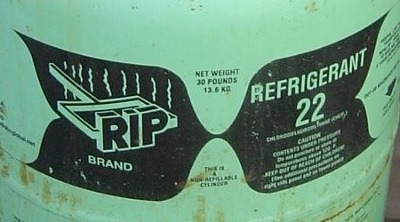FBI Investigates R-22 Substitute Air Conditioner Refrigerants

And the battle over air conditioner refrigerants continues. The US EPA just issued another warning, “cautioning homeowners, manufacturers of propane-based refrigerants, home improvement contractors and air conditioning technicians of the safety hazards related to the use of propane in existing motor vehicle and home air conditioning systems.” Now the FBI has entered the battle, too.
And the battle over air conditioner refrigerants continues. The US EPA just issued another warning, “cautioning homeowners, manufacturers of propane-based refrigerants, home improvement contractors and air conditioning technicians of the safety hazards related to the use of propane in existing motor vehicle and home air conditioning systems.” Now the FBI has entered the battle, too.
A year ago I wrote about the use of hydrocarbon-based refrigerants being sold as substitutes for R-22, the dominant refrigerant of the past two decades that is being phased out to protect the ozone layer. Yes, propane and other hydrocarbons can work just fine as refrigerants for air conditioners.
The problem arises when they’re used in place of non-hydrocarbon based refrigerants like R-22. Hydrocarbons are flammable and can create hazards for HVAC service technicians who may not take proper precautions if they don’t know that a flammable refrigerant has been substituted for the nonflammable they expect to be in the system.
You can find plenty of the substitutes online, and you don’t even have to be a licensed HVAC contractor to buy them. Evidently the problem hasn’t gone away since I wrote about it last year. Hence the FBI’s involvement. They’re looking for homeowners and do-it-yourselfers who have gotten these flammable refrigerants into their air conditioners so they can go after the sellers.
The FBI lists several refrigerant names they’re focusing their investigation on:
- Super-Freeze 22a
- Super-Freeze12a
- Super-Freeze 134a
- Enviro-Safe 22a
- R134a
See the FBI’s page to learn more about their investigation or to complete their questionnaire if you’ve gotten any of the unapproved refrigerants in your air conditioner.
Related Articles
Propane in Your Air Conditioner? Bad Idea!
The Science Behind the Phase-Out of R-22 Air Conditioner Refrigerant
HVAC Secret: An Air Conditioner Loophole the Size of the Ozone Hole
NOTE: Comments are moderated. Your comment will not appear below until approved.
This Post Has 3 Comments
Comments are closed.

Unfortunately, the
Unfortunately, the introduction of flammable refrigerants into R22 systems may not originate solely with DIY homeowners. Certain individuals who fancy themselves as HVAC technicians may also resort to unsafe refrigerants to make a sale.
To anyone reading this: do not introduce flammable refrigerants into any R22 air conditioning and refrigeration systems. If you don’t know whether it is flammable or not, find out. Don’t blunder ahead only to find out later…potentially after someone is injured or killed.
Until they end the sale of
Until they end the sale of r22 dry units the problem will continue.
The FBI, seriously?
The FBI, seriously?
Are the homeowners aware that the cost of the repair was lowered by the use of an unapproved refrigerant? Did the contractor defraud the homeowner by not telling him?
We install gas lines in house everyday. I fail to see the problem. Are we assuming a leak, as we have been conditioned, sorry, “trained”, to assume people unwittingly consume harmful quantities of lead? Or is this another red herring to justify new rules and a task force to stamp it out?
http://docs.lib.purdue.edu/cgi/viewcontent.cgi?article=1293&context;=iracc
How about some science?